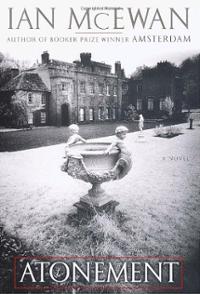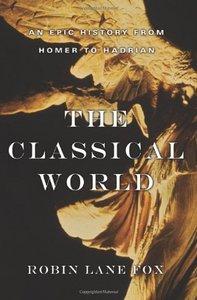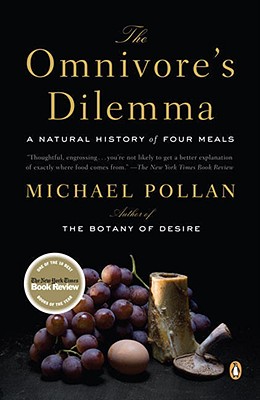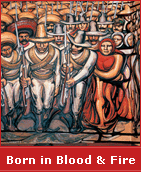 I don’t know about you, but I always have a collection of unread books on my shelves, picked up from used book stores or library sales. I always intend to get to them when I buy them, but sometimes they languish. Such was the case with a book by Ian McEwan, Atonement. I actually have two of his books on my shelves (the other is Saturday), but about a month ago a friend of mine recommended him as an author generally, and Atonement in particular, so I pulled the volume down and put it in the summer reading list stack.
I don’t know about you, but I always have a collection of unread books on my shelves, picked up from used book stores or library sales. I always intend to get to them when I buy them, but sometimes they languish. Such was the case with a book by Ian McEwan, Atonement. I actually have two of his books on my shelves (the other is Saturday), but about a month ago a friend of mine recommended him as an author generally, and Atonement in particular, so I pulled the volume down and put it in the summer reading list stack.
On one hand, I should have good things to say about this book: I read it quickly, in two non-consecutive days, and so I can fairly say that I found it compelling. Additionally, McEwan’s prose itself is rendered with remarkable skill: it is evocative, with pitch-perfect tone. Despite my many frustrations with this novel, his writing alone makes me think that I’ll still get around to reading Saturday someday.
But oh, those frustrations. There were a few. Most notably how much I hated the main character of the book (I don’t think I, as the reader, was supposed to, no), but we’ll get to her in a moment.
Firstly, McEwan is a writer writing about writing in many parts of this novel, which is a pet peeve of mine. The above-mentioned main character begins to write little stories at the age of 10 (we see her primarily pursuing this hobby at 13). This is fair enough — I think that is about when kids who are so inclined start writing. But it is not merely a part of her character outline that she writes stories; rather, McEwan takes the opportunity to rhapsodize about the craft of storytelling. I’m exaggerating only slightly with my snarky italics. The problem with this sort of going on about the profound art of writing stories is that it’s self-aggrandizing horseshit. It is one thing to describe a character as one who likes to construct fiction, and to tease out what that might imply about that character: they have a tendency to live in their own mind; they are, perhaps, particularly observant; they are, perhaps, abstractly empathetic, by which I mean, while they can easily suss out the feelings and predict the (re)actions of others, they nonetheless are at a remove from other people, seeing others as objects of consideration rather than fellow subjects in the world. These are just my thoughts on the subject, perhaps others’ would be different, but my point is, it’s not a bad project for an author per se to make a character a writer. But there is some line past which the belaboring of the craft of storytelling becomes a reflection not on the writer character but on the author, and oh my, what a god of imagination he or she can be! In short, it becomes obnoxious, because all of the author’s reflections on the writer character and their pursuit of writing as an art are necessarily reflections on the author him/herself as artist.
I find this especially obnoxious because, as a failed writer myself, let me dispel a little conceit: writing is not a mystical labor of godlike intuition and profoundly creative compulsion. Being a writer requires natural talent, yes, and when one really feels inspired to write, doing so can be exciting and rewarding. But being a writer also requires practice, tedium, and, frankly, drudgery. Most writers are not successful; I certainly wasn’t. Being a writer is also a lot of luck, like any career in the fine arts. Most of the time, writing is just staring at drafts in frustration, and, let’s be honest, most writing doesn’t contain blinding insights into the human condition. It’s a skilled art, but its end result is usually not much more than an entertainment for consumers, and while it can rarely transcend that to become Important, that moment of importance is even still a brief brief moment in the life of a writer overall.
So basically, let’s take the self-importance down a few dozen pegs, OK Ian?
Moving on. The book itself as it’s crafted presented me with some quandaries. For one, the writing, although lovely, occasionally turns towards the … improbable. Take this passage:
“The silence hissed in her ears and her vision was faintly distorted — her hands in her lap appeared unusually large and at the same time remote, as though viewed across an immense distance. She raised one hand and flexed its fingers and wondered, as she had sometimes before, how this thing, this machine for gripping, this fleshy spider at the end of her arm, came to be hers, entirely at her command. Or did it have some little life of its own? She bent her finger and straightened it. The mystery was in the instant before it moved, the dividing moment between not moving and moving, when her intention took effect. It was like a wave breaking. If she could only find herself at the crest, she thought, she might find the secret of herself, that part of her that was really in charge. She brought her forefinger closer to her face and stared at it, urging it to move. It remained still because she was pretending, she was not entirely serious, and because willing it to move, or being about to move it, was not the same as actually moving it. And when she did crook it finally, the action seemed to start in her finger itself, not in some part of her mind. When did it know to move, when did she know to move it? There was no catching herself out. It was either-or. There was no stitching, no seam, and yet she knew that behind the smooth continuous fabric was the real self — was it her soul? — which took the decision to cease pretending, and gave the final command.”
Now that sounds just lovely. But seriously, what the fuck? Go back. Read the passage again. In the first place, these are the supposed musings of a sheltered 13-year-old — really? For another, 5 demerits for describing the human hand as a “fleshy spider” at the end of one’s arm and “a machine for gripping”. Additionally, there is something just too precious about looking for one’s soul(!) in the “crest” of one’s intention to move a finger. This looking for the “real self” (NB: dear fellow writers, if you find yourself musing about the “real self”, stop, take a nap, and come back to reconsider) by navel-gazing one’s own reflexes is writerly and unrealistic — this is not how humans, even very thoughtful, precocious humans, consider the world, and especially not in such abstract language.
But it sounds nice! It sounds … deep. This sort of tipping into absurdity is a problem McEwan has occasionally, it would seem.
Another problem with the way the novel is crafted: its engagement with World War II left me puzzled. Let me explain. The novel happens in three parts. The first occurs in 1935, on a single day and night during which we are eloquently introduced to a family and its moving parts (including that main character, the 13-year-old, whom I dislike so much), as they throw a small garden party in midsummer at their quasi-aristocratic British estate. This makes up the first half of the book or so (my copy is 350 pages), and it builds slowly, acquainting us with the characters of the novel until it concludes with an event the consequences of which play out in parts two and three. Part two of the book is set four years later; one of the characters is retreating from the Germans in northern France. I have sat and tried to think of why McEwan decided to stage this novel, at least in part, in battle in WWII. In the first place, the book did not seem to readily provide the answer to this question on its own. Don’t misunderstand, the book makes chronological sense and the plot is adequately tied to the setting, but: war is a loaded topic, McEwan is describing a loaded historical moment, and surely an author wouldn’t deploy such a time casually, for shits and giggles. I have considered that the transition from prewar to wartime Britain might usefully reflect on the maturation of the novel’s central character (the third part of the book takes place in London in 1940), and might parallel in some way the traumas and the strippings away of Briony’s (my loathed 13-year-old’s) adolescence, particularly in light of her crimes in the conclusion of Part One. (We’ll get there!) But that explains only the trajectory of the first and the third parts of the novel; the second part is set squarely in war-torn France as British forces fall back in hasty retreat, and again, this setting and this historical context seem too full, too fraught, to be deployed without larger symbolic purpose. One of the characters is at war, and it’s a trial for him, surely. But is that enough to justify 100 pages of disgraced battlefield? I kept looking for something that I don’t think was there, a significance the reader anticipates but is never rendered up. I am left with this feeling that McEwan — whom one can tell researched this portion of the novel ruthlessly for historical accuracy — wrote about the flight to Dunkirk because he thought it would be neat; I challenge this as a good decision, or, at least, as a fully realized component of the novel. McEwan left a lot on the field in this portion of the book.
Finally, let me come to Briony herself. To begin with, I should confess that books, movies, and television shows that are primarily about children and their concerns bore me. I have no desire to revisit the growing pains of my own youth, and I never found the reiteration of such struggles in art to be particularly useful or engaging for the adult version of myself. Again, frankly, I find children boring. But the recommender of this book does also, and so I took it on faith that McEwan must be doing something different in rendering youth.
Not really. Oh, how I hated Briony. The character as a young teen is precociously self-assured despite being so breathtakingly naive that I could not stop myself from spontaneously composing dialogue in my mind for the other characters to utter for the sheer purpose of humiliating Briony. She is also self-important and self-involved to the point of narcissism. These are deep character flaws, and yet they go unremarked upon by other characters or the author. And these flaws are not harmless — by the end of the first part of the book, her undeserved conceit — and her willingness to lie (though the character herself refuses to own up to the fact that she was lying, throughout the entire book, rather calling herself confused) — ruin the lives of a family friend and her own sister.
In the third part of the book, Briony is 18, but still cowardly, still apparently unclear as to the full dimensions of her own actions in the world, and, to me, still irritating for all that. But at this point in the book, I perked up a bit, as there seemed to be some hope for her — she seemed to be finally maturing, finally realizing her flaws. But then comes an epilogue. I don’t spoil much to tell you that it turns out a conceit of the book is that it is actually a non-fiction novel written by Briony, whom we encounter again in a first-person epilogue supposedly written in her late 70s. Still self-involved, still prattling about writing, the elder version of Briony is revealed to be profoundly uncharitable in her judgments of others, despite how much charity the forgiveness of her own young life requires. I was especially shocked by Briony’s lack of charity towards the character of her slightly older cousin (now an old woman as well) who was — again, I don’t spoil much here — a rape victim at 15. This ugly misogyny could be as much the unconscious fault of McEwan as of the character Briony, I couldn’t say for sure. But regardless, it’s a nasty note to bring the character out on.
And speaking of nasty, the “author” herself feels compelled in the final pages of the book to ruin its ending for “her” readers, out of what comes off as a selfish need to fulfill her own supposed obligations to truth, a compulsion I found laughably undeserving of the reader’s consideration; Briony, you have not earned the right to claim that you value truth above all else, or to be its defender in spite of its unpleasantness.
Long story short, I hated this bitch her whole life long. And I could be wrong, but I don’t think I was supposed to — I don’t think it was one of those books. So, you know, given that, that’s a problem, right? It actually might have been interesting if I thought I was supposed to hate Briony, given that the book is supposedly a true story written by her: the psychological implications of that are noteworthy. But even if that is the case, the revelation that the book is patially autobiographical comes too late, and is not given enough space on the page, for the reader to really work through those potential psychological implications. So while I don’t think I’m supposed to hate Briony, even if I am, the book still fails to give that idea the space and time it needs to really work on the reader’s experience with the character, assuming that forcing the reader to fully flip flop their understanding of a book after it’s already over is a cheap trick. (Which it is.)
Oh, Lordy, Ian McEwan. I don’t know what to say. McEwan’s writing talent is self-evident (not just in his prose, but in his composition’s balance and momentum, his characterizations, and his emotional acuity). But as I couldn’t stop myself from going on about above, this novel so frustrated me that I don’t know if I can call this a good book or not. I’ll leave it for you to decide. As I said, I will probably take on Saturday in the not-so-distant future, if you want to consider that. I hope there are no children in that one.
 As our story opens up in rural Virginia we find the Bondurant boys, Shia Lebouf, Tom Hardy, and Jason Clarke , distributing mason jars full of their homemade moonshine amongst the county. Known to have the best whiskey around the boys are in high demand and raking in the profits.
As our story opens up in rural Virginia we find the Bondurant boys, Shia Lebouf, Tom Hardy, and Jason Clarke , distributing mason jars full of their homemade moonshine amongst the county. Known to have the best whiskey around the boys are in high demand and raking in the profits.  I don’t know about you, but I always have a collection of unread books on my shelves, picked up from used book stores or library sales. I always intend to get to them when I buy them, but sometimes they languish. Such was the case with a book by Ian McEwan, Atonement. I actually have two of his books on my shelves (the other is Saturday), but about a month ago a friend of mine recommended him as an author generally, and Atonement in particular, so I pulled the volume down and put it in the summer reading list stack.
I don’t know about you, but I always have a collection of unread books on my shelves, picked up from used book stores or library sales. I always intend to get to them when I buy them, but sometimes they languish. Such was the case with a book by Ian McEwan, Atonement. I actually have two of his books on my shelves (the other is Saturday), but about a month ago a friend of mine recommended him as an author generally, and Atonement in particular, so I pulled the volume down and put it in the summer reading list stack. Dostoevsky’s work comes later, and his themes are much more psychological. When HIS humble clerk goes mad in “The Double”, it seems to be from a combination of his own existential crises; the inhumanity of others towards him; and HIS inhumanity towards THEM. Dostoevsky is consistently driven to explore this rift between people — it’s a central concern of Brothers K as well. He’s also the great psychologizer of characters: it’s not what’s happening around them, it’s what’s happening within them, at least in large part.
Dostoevsky’s work comes later, and his themes are much more psychological. When HIS humble clerk goes mad in “The Double”, it seems to be from a combination of his own existential crises; the inhumanity of others towards him; and HIS inhumanity towards THEM. Dostoevsky is consistently driven to explore this rift between people — it’s a central concern of Brothers K as well. He’s also the great psychologizer of characters: it’s not what’s happening around them, it’s what’s happening within them, at least in large part.
 Eleventy weeks ago, I started reading
Eleventy weeks ago, I started reading  The problem, here, is that I have not spent two weeks with The Classical World, I have spent eleventy, or thereabouts, and am still not half-way through. On the other hand, drained by continuing efforts to read the book, I picked up Michael Pollan’s
The problem, here, is that I have not spent two weeks with The Classical World, I have spent eleventy, or thereabouts, and am still not half-way through. On the other hand, drained by continuing efforts to read the book, I picked up Michael Pollan’s  By the way, if you’re looking for a good one-book history of Latin America, allow me to recommend
By the way, if you’re looking for a good one-book history of Latin America, allow me to recommend 

